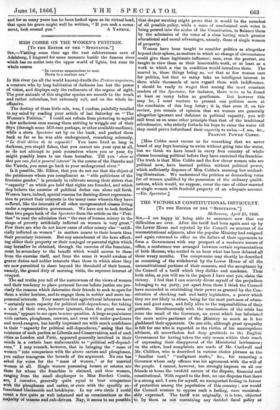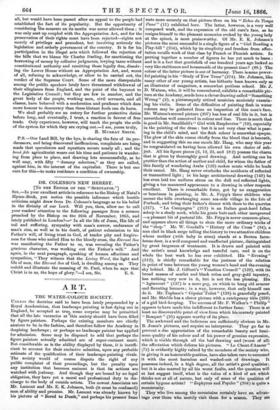THE VICTORIAN CONSTITUTIONAL DIFFICULTY. [To THE EDITOR OF THE "SPECTATOR.")
Melbourne, April 25, 1866. Szu,—I am happy in: being able to announce now that our difficulties are over. After the tariff had been again sent up by the Lower House and rejected by the Council on account of its unconstitutional adjuncts, after the popular Ministry had resigned and again returned to office on the failure of their opponents to form a Government with any prospect of a moderate tenure of office, a conference was arranged between certain representatives of both Houses, who settled in an hour what has been debated all these weary months. The compromise may shortly be described as consisting of the withdrawal by the Lower House of all the unconstitutional portions of their measure, and the acceptance by- the Council of a tariff which they dislike and condemn. Thus both sides, as you will see in the papers I have sent you, claim the victory. I feel that I can scarcely divest myself of the prejudices belonging to my party, yet apart from these I think the Council have succeeded in establishing their power as granted by the Con- stitution of checking rash and hasty legislation, a power which they are not likely to abuse, being for the most part men of educa- tion and good sense, and fully alive to the responsibilities of their position. Simultaneously with the termination of the crisis has come the recall of the Governor, an event which has infuriated the more active partisans of the Ninistry as much as it has gladdened their opponents. On one side, although great sympathy is felt for one who is regarded as the victim of his unscrupulous advisers, all nevertheless feel deep gratitude to the English Government for having taken the only means within their reach of expressing their disapproval of the Ministerial lawlessness ; on the other, loud complaints are made of Mr. Cardwell and Mr. Childers, who is described in various choice phrases as the "familiar toad," "malignant snake," &c., for removing a Governor whose only offence was his agreement with the will of the people. I cannot, however, too strongly impress on all our friends at home the twofold nature of the dispute, financial and constitutional. With regard to the first, no one disputes that there is a strong and, I own for myself, an unexpected feeling in favour of protection among the population of this country ; nor would the Council venture to oppose such a feeling, once unmistak- ably expressed. The tariff was originally, it is trite, objected to by them as not containing any decided fiscal policy at
all, but would have been passed after an appeal to the people had established the fact of its popularity. But the opportunity of considering the measure on its merits was never allowed them ; it was only sent up coupled with the Appropriation Act, and for the preservation of their rights must have been rejected—rights not merely of privilege and precedent, but involving seriously the legislation and orderly government of the country. It is for his participation in the illegal acts which followed the rejection of the bills that we blame Sir Charles Darling, for sanctioning the borrowing of money by collusive judgments, levying taxes without constitutional authority and remitting those legally due, dissolv- ing the Lower House without an Appropriation Act, and, worst of all, refusing to acknowledge, or allow to be carried out, the verdict of the Supreme Court. Some of the more disreputable among the public speakers lately have threatened withdrawal of their allegiance from England, and the point of the bayonet to the Legislative Council ; but they are few in number, and the great body. of the people, working men, civil servants, and all classes, have behaved with a moderation and prudence which does more honour to democracy than these blatant fools can do harm.
We shall probably see an outcry for further protective duties before long, and eventually, I trust, a reaction in favour of free trade. Only experience, however, will teach the people the evils of the system for which they are crying out.—I am, yours truly,
R. MURRAY SMITH.
P.S. —Our Land Bill, by the bye, is sharing the fate of its pre- decessors, and being discovered inefficacious, complaints are being made that speculators and squatters secure nearly all ; and the bond fide agriculturist wears out his time and patience in wander- ing from place to place, and drawing iota unsuccessfully, as he well may, with fifty "dummy selectors," as they are called, against him, in the interest of the capitalist. There is but one cure for this—to make residence a condition of ownership.































 Previous page
Previous page